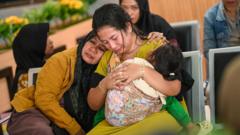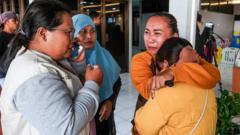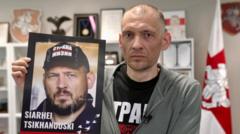After serving lengthy sentences for attempting to smuggle heroin, the group looks forward to reintegration into society with ongoing support and understanding from the community.
Bali Nine Members Return Home After Two Decades in Prison

Bali Nine Members Return Home After Two Decades in Prison
Five members of the Bali Nine drug smuggling group express relief upon returning to Australia after nearly 20 years in Indonesian prisons.
The five remaining members of the notorious Bali Nine drug smuggling group have returned to Australia, expressing feelings of relief and happiness after nearly two decades spent in Indonesian prisons. Matthew Norman, Scott Rush, Martin Stephens, Si Yi Chen, and Michael Czugaj arrived back on Australian soil on Sunday, following years of advocacy for their return led by Australian officials.
A family statement highlighted their excitement to reintegrate into society, emphasizing a wish to contribute positively going forward. The case of the Bali Nine, which made headlines in 2005, involved nine young Australians attempting to smuggle 8.3 kilograms (18 pounds) of heroin out of Bali, resulting in their arrest at the airport and a local hotel via a tip-off from Australian authorities.
The case drew international attention, especially after the execution of two key members, Andrew Chan and Myuran Sukumaran, in 2015, which strained diplomatic relations between Australia and Indonesia. The remaining members, who were primarily under 21 at the time of their offenses, received sentences ranging from 20 years to life imprisonment.
One member, Tan Duc Thanh Nguyen, passed away in prison due to cancer in 2018. Renae Lawrence, the only woman in the group, was released earlier after her sentence was commuted and returned to Australia after serving nearly 13 years.
The five latest returnees, whose ages now range from 38 to 48, were transported back to Australia as prisoners but have reportedly been granted effective freedom upon arrival.
Prime Minister Anthony Albanese acknowledged in a release that while the individuals committed serious crimes, it was a time to embrace their return to Australia. He also expressed gratitude towards Indonesian president Prabowo Subianto for the decision made regarding their return.
The group and their families have publicly thanked those who advocated for their release, calling for privacy as they adjust to life outside prison. They emphasized that supporting their welfare will be paramount in this transitional period and asked the media and community for understanding.
A family statement highlighted their excitement to reintegrate into society, emphasizing a wish to contribute positively going forward. The case of the Bali Nine, which made headlines in 2005, involved nine young Australians attempting to smuggle 8.3 kilograms (18 pounds) of heroin out of Bali, resulting in their arrest at the airport and a local hotel via a tip-off from Australian authorities.
The case drew international attention, especially after the execution of two key members, Andrew Chan and Myuran Sukumaran, in 2015, which strained diplomatic relations between Australia and Indonesia. The remaining members, who were primarily under 21 at the time of their offenses, received sentences ranging from 20 years to life imprisonment.
One member, Tan Duc Thanh Nguyen, passed away in prison due to cancer in 2018. Renae Lawrence, the only woman in the group, was released earlier after her sentence was commuted and returned to Australia after serving nearly 13 years.
The five latest returnees, whose ages now range from 38 to 48, were transported back to Australia as prisoners but have reportedly been granted effective freedom upon arrival.
Prime Minister Anthony Albanese acknowledged in a release that while the individuals committed serious crimes, it was a time to embrace their return to Australia. He also expressed gratitude towards Indonesian president Prabowo Subianto for the decision made regarding their return.
The group and their families have publicly thanked those who advocated for their release, calling for privacy as they adjust to life outside prison. They emphasized that supporting their welfare will be paramount in this transitional period and asked the media and community for understanding.





















